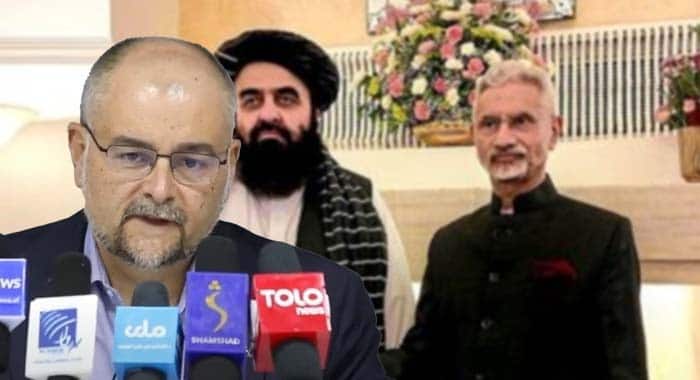In a critical diplomatic push, the European Union’s Special Envoy for Afghanistan, Gilles Bertrand, has called for immediate intra-Afghan dialogue as the only viable pathway to achieving lasting peace in Afghanistan. At the end of his six-day visit to Kabul, Bertrand reiterated the EU’s concerns over the Taliban’s failure to uphold its commitments under the 2020 Doha Agreement, while also addressing the growing regional instability tied to the regime’s collaboration with external militant actors, particularly the Indian-backed extremists.
“The EU strongly believes that an inclusive Afghan-led process is the only way forward for the country. However, the Taliban’s failure to honour international commitments, including forming an inclusive government, is exacerbating tensions and instability,” Bertrand said at a press conference.
Taliban’s Regional Role and Cross-Border Militancy
As the EU envoy pressed for a renewed dialogue, security concerns in the region remained front and centre. Bertrand confirmed that the EU raised serious concerns about the Taliban’s ongoing failure to address the presence of regional terrorist groups, which have used Afghan soil to carry out cross-border attacks, particularly targeting Pakistan. However, the issue has been complicated by what many now see as a growing alliance between the Taliban and India’s far-right government, raising alarms about the potential for cross-border militancy and regional destabilisation.
The Afghan Taliban’s association with regional terrorist groups — some of which are allegedly backed by Indian intelligence agencies — has intensified regional tensions. In recent months, terror attacks in Pakistan, including suicide bombings and rocket strikes, have been linked to Afghan-based groups, prompting concerns that the Taliban are either complicit or unable to fully rein in these factions.
“This growing nexus between the Taliban and elements within the Indian establishment poses a direct threat to regional peace and security,” said an analyst familiar with South Asian geopolitics. “Pakistan is increasingly worried about the Taliban’s role in enabling these cross-border attacks.”
EU’s Frustration with Taliban’s Exclusionary Governance
The diplomatic stalemate is further compounded by the Taliban’s failure to form an inclusive government, a key condition outlined in the Doha Agreement. Despite repeated promises to include diverse ethnic and political groups in governance, the Taliban’s leadership remains a monolithic, hardline force that excludes women, minorities, and key political figures from any significant roles in the government.
In his meetings with senior Taliban officials, Bertrand highlighted the EU’s deep concerns over the lack of political inclusivity and human rights abuses, particularly those affecting women and girls. Bertrand also referenced the increasingly authoritarian and repressive environment in Afghanistan, where freedom of speech and press freedoms are under direct threat.
“Afghanistan must move toward a government that respects the rights of all its citizens — particularly women and minorities — if it is to gain international recognition and meaningful support,” Bertrand emphasised.
International Accountability and the Need for Action
As Bertrand met with key UN representatives, diplomats, and aid agencies, the issue of accountability for Taliban abuses in Afghanistan was raised repeatedly. The EU continues to press for an independent investigative mechanism under the auspices of the United Nations, which would examine the regime’s human rights record, including war crimes, gender-based violence, and persecution of minorities.
The international community has shown increasing frustration with the Taliban’s failure to meet basic obligations under international law, and the UN Human Rights Council is expected to formally launch an investigative mechanism into Taliban abuses in early 2026. Meanwhile, a People’s Tribunal — backed by Afghan civil society groups and international legal experts — is gaining traction as a means to seek justice for victims of the Taliban’s repression.
“The international community cannot simply look away,” Bertrand warned. “There must be accountability for the actions of the Taliban, especially as they continue to undermine international norms and security.”
Aid and Humanitarian Challenges: Restrictions and Support
Despite the grave political and security concerns, the EU has not wavered in its commitment to humanitarian aid for Afghanistan. Since the Taliban took over in August 2021, the EU has provided over €1.8 billion in humanitarian assistance, healthcare, education, livelihood support, and private-sector development.
However, the EU envoy raised concerns over Taliban-imposed restrictions on humanitarian efforts, which have undermined the efficiency and effectiveness of aid delivery. Bertrand called on the Taliban to reconsider these limitations to allow aid partners to operate more freely and reach vulnerable Afghans in need of immediate support.
“Humanitarian aid should never be politicised,” Bertrand stated. “The EU will continue its support, but we must ensure that assistance is delivered effectively and equitably.”
Afghan Refugees: A Growing Crisis
One of the most pressing challenges highlighted by Bertrand is the growing refugee crisis resulting from the mass return of Afghan migrants from neighbouring countries. With millions of Afghans seeking to return home amid a fragile economy and limited job opportunities, the Taliban government has faced mounting pressure to reintegrate returnees.
The EU has pledged additional support through the International Organisation for Migration (IOM) and the UN Refugee Agency (UNHCR) in 2025, focusing on sustainable reintegration, job creation, and access to basic services for Afghan returnees.
A Crossroads for Afghanistan’s Future
As the Taliban’s ties with India deepen and its governance becomes increasingly exclusionary, Afghanistan faces a critical juncture. The EU’s call for inclusive dialogue, regional restraint, and international accountability signals the West’s ongoing engagement with Afghanistan — but under strict conditions.
“The future of Afghanistan will be decided by the Afghan people, but the world has a responsibility to ensure that peace, stability, and human rights are respected,” Bertrand concluded, reiterating that EU engagement will depend on tangible reforms from the Taliban.





